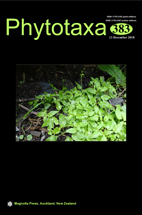Abstract
Betoideae is a monophyletic group currently comprising five genera (Aphanisma, Beta, Hablitzia, Oreoblitum, and Patellifolia) and 11‒16 species. Acroglochin was formerly also included in subfam. Betoideae by various authors, although recently molecular data demonstrated that this genus is probably an ancient lineage basal to the remaining Betoideae. Although Acroglochin is also separated from both chorological and morphological viewpoints and some authors suggested its segregation in a separate subfamily, this proposal is premature, and discussion on that is presented here. A complete nomenclatural treatment of A. persicarioides, the only currently recognized species of Acroglochin, is provided, including all known heterotypic and homotypic synonyms. The names Lecanocarpus, Acroglochia, Blitanthus, Amaranthus acroglochin, Am. cauliflorus, Am. chenopodioides, Am. diandrus, Am. persicarioides, Boehmeria amaranthus, Blitanthus nepalensis, Acroglochia chenopodioides, Acroglochin schraderianum, Chenopodium pakistanicum Aellen were investigated. The name Lecanocarpus is a heterotypic synonym of Acroglochin, Acroglochia is an invalid name, and Blitanthus (initially published as nomen nudum) is illegitimate. Types for Acroglochin chenopodioides, Ac. obtosufolium, Amaranthus acroglochin, Am. cauliflorus, Am. diandrus, Am. persicarioides, and Boehmeria amaranthus were designated based on specimens deposited at B, E, GB, and LE. Blitanthus nepalensis, Acroglochia chenopodioides, Acroglochin schraderianum were not validly published (Arts. 36.1b, 38.1, 38.2), while the name Chenopodium pakistanicum Aellen occurred only on a specimen label (herbarium W). Finally, notes on the morphology and distribution of Acroglochin are provided.

